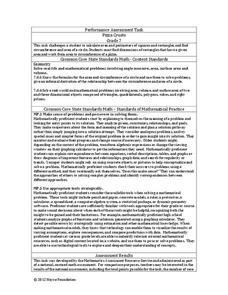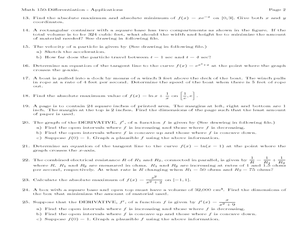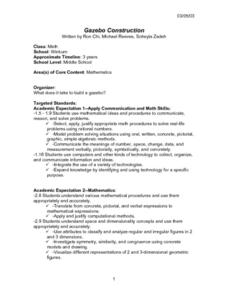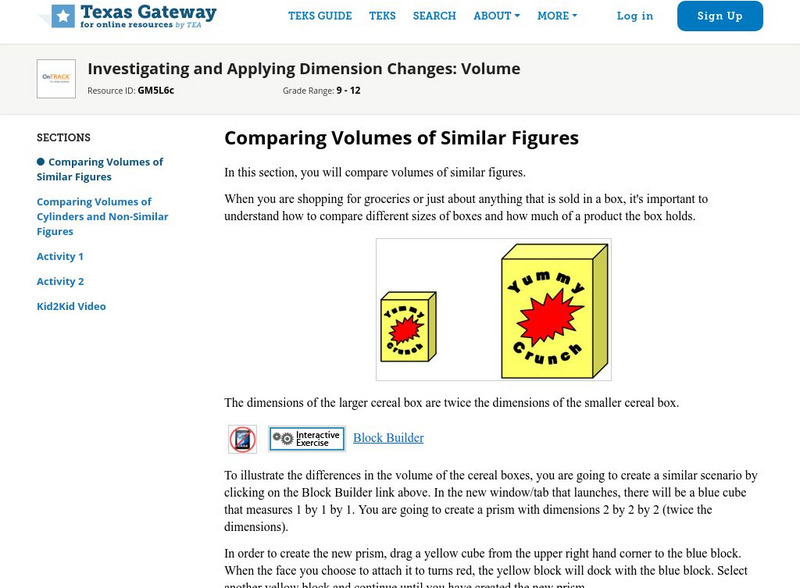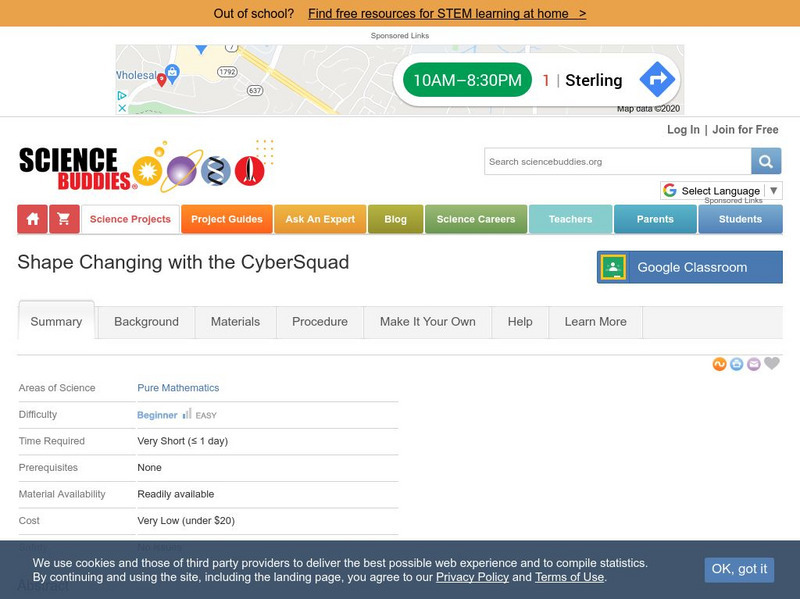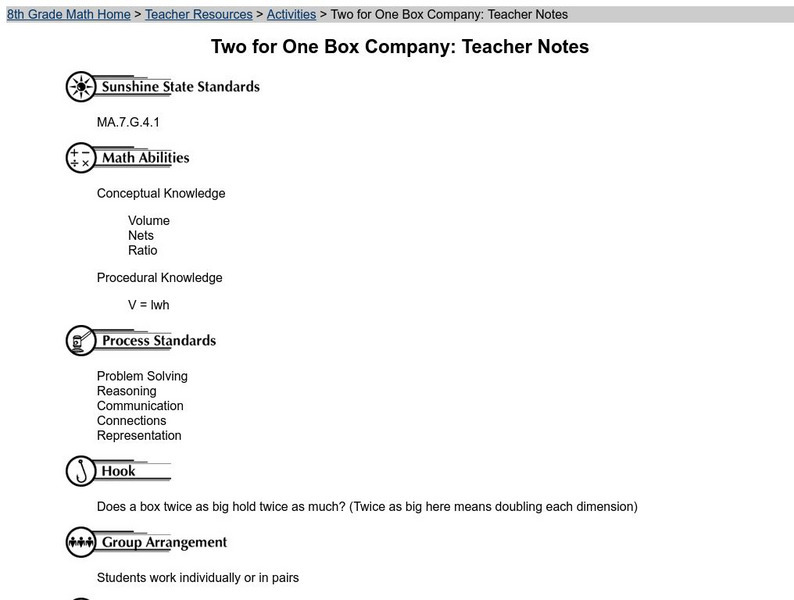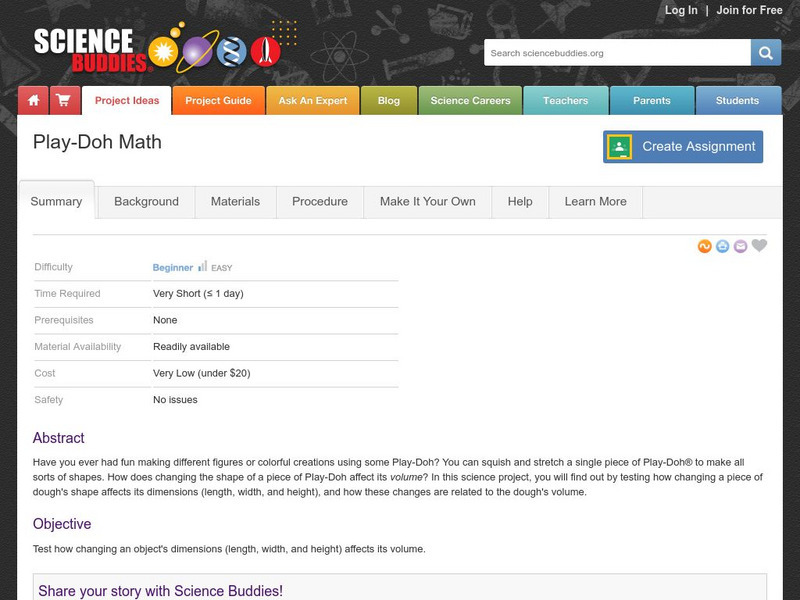Curated OER
Measuring with Mathematics
Eighth graders discover how the change in the dimensions of a shape cause a change in the overall area of the shape, but the perimeter stay the same. They, in groups, go out to the playground and construct large areas using stakes and rope.
Curated OER
Area graphics for 7th graders
Students randomly select dimensions for three geometric shapes (square, right triangle and circle). From the graphs they compare and contrast the graphical results of each shape.
Curated OER
Geometry and Shapes
High schoolers discuss and identify polygons and lines. In this geometry lesson, learners review liner, square and cubic units so they can incorporate it into the lesson on measurement and creating packing that are cost effective.
Curated OER
Inquiry Unit: Modeling Maximums and Minimums
Young mathematicians explore the maximun area for patio with the added complexity of finding the mimimum cost for construction. First, they maximize the area of a yard given a limited amount of fence and plot width v. area on a scatter...
Noyce Foundation
Pizza Crusts
Enough stuffed crust to go around. Pupils calculate the area and perimeter of a variety of pizza shapes, including rectangular and circular. Individuals design rectangular pizzas with a given area to maximize the amount of crust and do...
Santa Monica College
The Density of Liquids and Solids
There are underwater rivers that flow on the ocean floor thanks to a difference in density. Scholars learn about the density in both liquids and solids in the second lesson of an 11-part series. They then determine the density of water,...
Teach Engineering
Discovering Relationships Between Side Length and Area
Consider the relationship between side length and area as an input-output function. Scholars create input-output tables for the area of squares to determine an equation in the first installment of a three-part unit. Ditto for the area of...
Curated OER
Blast Off
In this physical science exploration, small groups place a piece of antacid tablet into a film canister and step back to time how long it takes for the top to pop. They repeat the activity, altering either the amount or temperature of...
Curated OER
Rep Tiles
Third graders use pattern blocks of one shape at a time to try to create a similar shape. They compare the perimeter of the new figure with the perimeter of the original shape and look for a pattern. Students use the pattern to predict...
Curated OER
Beads, Balls, and Beakers
Students analyze the amount of space required to pack round objects. In this geometry lesson, students practice using space economically by practicing packing spheres into beakers. They then translate this concept to molecules being...
Curated OER
Math 150 - Differentiation Applications
In this differentiation worksheet, students solve 25 short answer word problems. Students solve application word problems by finding the derivatives of functions.
Curated OER
Pop Rocket - Trash to Treasure
First off, Newton's laws of motion aren't often taught at 2nd grade, so this lesson plan may be more appropriate for upper elementary learners. It begins with a discussion and demonstration of the laws of motion, and then has individuals...
Curated OER
Optimization For Breakfast
Students identify he proportion of a cereal box. In this algebra lesson, students define the relationship between patterns, functions and relations. They model their understanding using the cereal box.
Curated OER
Function Tables
High schoolers practice representing problems found in the real world in terms that can be translated into mathematical expressions. The situations are represented in tables and graphs by students.
Curated OER
Gazebo Construction
Young scholars create and give oral proposals for the construction of a gazebo using a blueprint created with Geometer's Sketchpad. They then build a gazebo model using the blueprints created and provide evidence why it should be...
Curated OER
Worksheet 22-Fall 1995
In this math activity, students examine the graph of the derivative. Then they determine the critical points that correspond to the relative extrema.
Curated OER
Junk Mail Jewelry
Students create jewelry from junk mail. In this visual art lesson, students use junk mail to design necklaces and bracelets.
Texas Education Agency
Texas Gateway: Investigating and Applying Dimension Changes: Volume
The student will describe the effects of changing one or more dimensions on the volume of a 3-dimensional figure.
Science Buddies
Science Buddies: Shape Changing With the Cyber Squad
In this project, you will make 2-dimensional templates, called nets, that fold up into 3-dimensional (3-D) shapes. By making shapes of different sizes, you will be able to see how 3-D shapes change with size. In your findings you will...
University of South Florida
Fcat: Two for One Box Company: Teacher Notes
At this site students use proportions to explore how volume is effected by dimension changes. This hands-on activity can be done individually or in pairs.
Science Buddies
Science Buddies: Play Doh Math
One piece of Play-Doh can make many different shapes. Even though you can change the shape by squishing or stretching the Play-Doh, it is still the same size unless you add or take away some of the dough. Try this experiment to test how...






